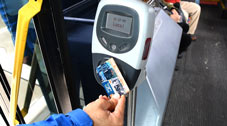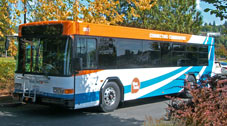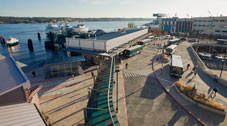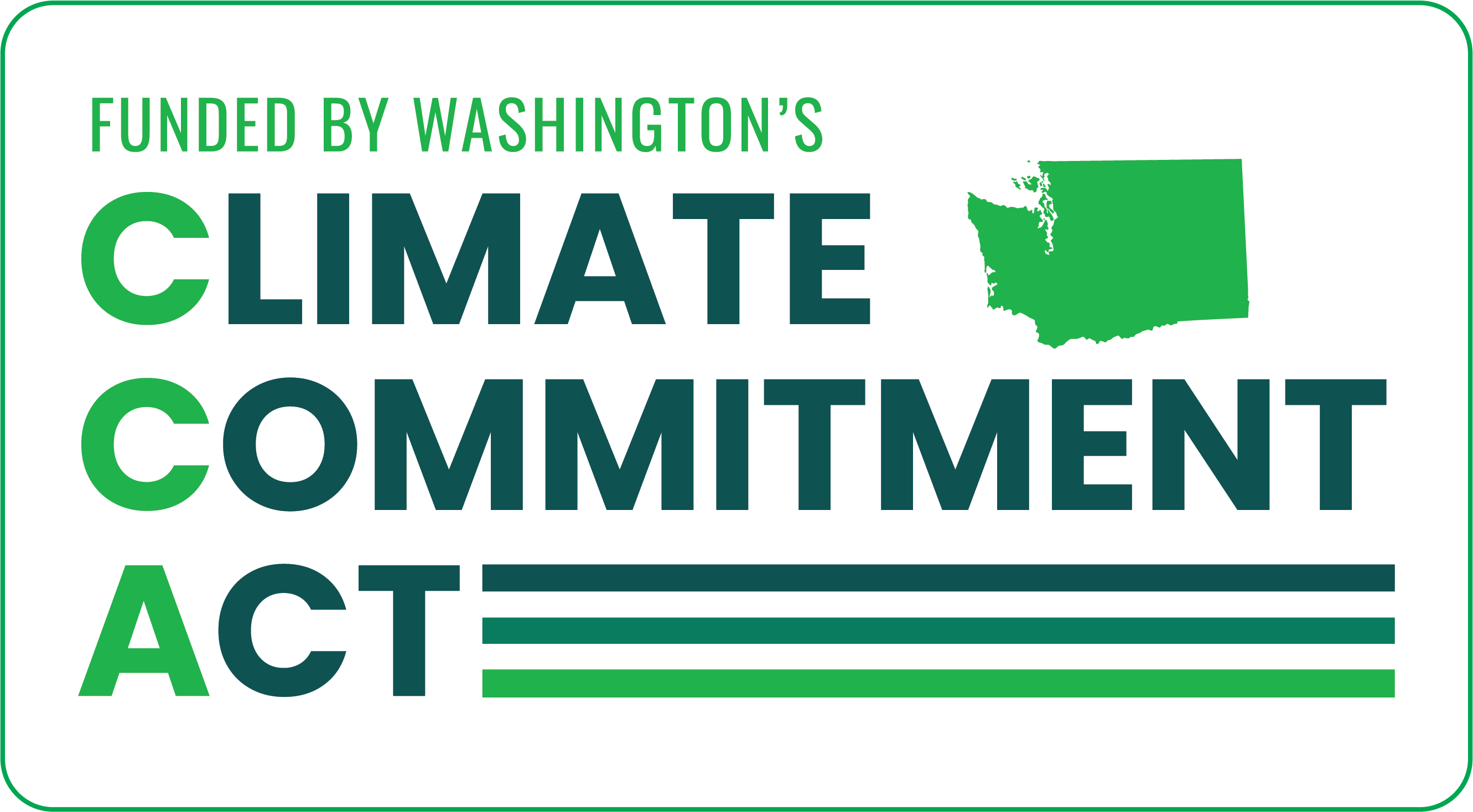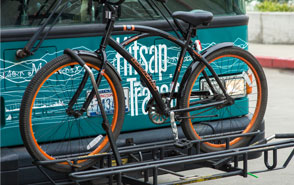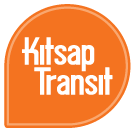LEARN KITSAP TRANSIT
Electric Fast Foil Ferry
OverviewIn Washington State in the late 19th and early 20th centuries, a fleet of steamships connected communities across Puget Sound. Now, a century later, a consortium of public and private entities is moving forward with a vision to relaunch the "Mosquito Fleet" using modern, environmentally friendly fast ferries. A group of stakeholders – which includes Kitsap Transit, local ports and utility authorities – formed a Joint Innovation Project team* to advance an innovative mobility solution that will reduce emissions and vehicle traffic along the I-5 corridor. This project funds the development of a design model for a high-speed passenger ferry powered by battery-electric, low-emissions technology. The state-of-the-art design will use hydrofoils, lightweight carbon fiber construction and batteries to speed up travel between urban centers and suburban and rural communities, using significantly less energy than conventional fast ferries. *The JIP team includes Kitsap Transit, WA Maritime Blue, Glosten and Bieker Boats d.b.a Foil Ferry, LLC., DNV, Port of Anacortes, Port of Bellingham, Port of Skagit, and Tacoma Power with support from the Economic Development Alliance of Skagit County.
BackgroundIn 2020, Kitsap Transit received a Federal Transit Administration research award to advance the technology design and develop a business model for the commercialization of the vessel and supporting infrastructure. The award was made possible by local matches from the Ports of Anacortes, Bellingham, and Skagit, and in-kind donations from the JIP team; for a total estimated project budget of $611,910. The all-electric Fast Foil Ferry will provide the next significant jump in performance and capability for fast ferries by significantly reducing wake, eliminating local emissions and providing a quiet, comfortable ride. What's Happening Now?Project Phase: Planning In 2021, Kitsap Transit and the JIP team started the Federal Transit Administration’s Accelerating Innovative Mobility (AIM) research project. As a key early project step, DNV performed a Route Economic Viability Study that resulted in the selection of Kitsap Transit's existing Bremerton-Seattle route for the Electric Fast Foil Ferry demonstration. Glosten and Bieker Boats (collectively known as Foil Ferry, LLC) advanced the Electric Fast Foil Ferry from concept to preliminary design. A state-of-the-art carbon fiber hydrofoil design will allow the ferry to travel faster than diesel ferries with a dramatically lower carbon footprint. The preliminary design calls for the vessel to carry 150 passengers and be able to complete one full round trip (approximately 30 nautical miles) on a single battery charge. Foil Ferry incorporates numerous collision safeguards, including a novel automated object detection to reduce the risk of collisions and a collision absorption system (patent pending). The ferry features passenger amenities, including bicycle storage inside the cabin, to provide a comfortable commute while bridging the Puget Sound waterway. The Electric Fast Foil Ferry will have extremely low wake, low airborne and underwater noise, a smooth ride for passenger comfort and zero carbon emissions from operation. While Foil Ferry, LLC worked on the preliminary design, DNV assessed the shoreside infrastructure required to support the vessel’s operations as well as reviewed and compiled the regulatory and permitting requirements for the project, followed by concept risk mitigation. Additionally, DNV analyzed the possible economic and environmental impacts of the Foil Ferry’s operation to validate the anticipated project benefits. WA Maritime Blue led the project management and development of the Kitsap Transit Fast Foil Ferry Business Model. This plan compiled the project research and concluded: "The Foil Ferry offers a safe, reliable, and cost–effective option while minimizing the environmental impact on air, water quality, and marine life compared to traditional diesel-powered alternatives. The preliminary design and economic and environmental impact studies validate the Foil Ferry concept design for the Bremerton-Seattle route, showing Foil Ferry to have environmental benefits and estimated reduction of annual operating costs by 35% when compared to conventional diesel-powered fast ferries." The JIP team is currently finalizing the planning phase and is ready to advance the project with the objective of piloting the first all-electric Fast Foil Ferry on the Kitsap Transit Bremerton-Seattle route and relaunching an alternative energy "Mosquito Fleet." Project Phase: Design In 2024, Kitsap Transit received $1.2 million from the Washington State Department of Commerce for the design of an all-electric, zero-emission fast ferry demonstration vessel and its shoreside charging infrastructure. The project includes funding from the Washington State Climate Commitment Act (CCA)**. This grant builds upon a $4 million state Legislature grant that will help pay for the design of the demonstration vessel: a scaled-down version of the 150-passenger Foil Ferry designed by Glosten and Bieker Boats. The demonstration vessel is intended to prove the viability of the technology and prepare the way for the first all-electric hydrofoil fast ferry to operate on Puget Sound. The Foil Ferry demonstration vessel will feature the same hydrofoil design, lightweight carbon fiber construction, and battery-electric propulsion as the full-size Foil Ferry and provide Glosten, Bieker Boats, and the rest of the project team with valuable feedback on the design in real-world scenarios. Having a functioning prototype will also help mitigate design and schedule risks, increase reliability, and reduce the program cost and timeline ahead of the full-scale functional design and construction phases. **The Kitsap Transit Electric Fast Foil Ferry Demonstrator and Shorecharging Design Project is supported with funding from Washington’s Climate Commitment Act. The CCA supports Washington’s climate action efforts by putting cap-and-invest dollars to work reducing climate pollution, creating jobs, and improving public health. Information about the CCA is available at www.climate.wa.gov. |
Electric Fast Foil Ferry Concept Project DocumentsProject Contact
|

What's Next?
Kitsap Transit and our partners are working to secure additional grant funding to pay for the functional design and construction of the full-scale all-electric Fast Foil Ferry and supporting shoreside infrastructure.
There’s still work to do – we need to finalize the design of terminal upgrades, including optimization of the physical connection between grid and vessel, shoreside battery design to reduce electrical demand charges, and permitting. Before Foil Ferry, LLC finalizes the full vessel design, a 15-to 20-passenger prototype will be built. Prototype testing will be used to validate the design and system operation, by testing controls, foil shape and position, dynamic stability, propulsion system, and safety features, to reduce the commissioning time of the first full-scale vessel.
Kitsap Transit is pursuing federal Department of Transportation/Federal Transit Administration funding for:
- Testing the 15-to 20-passenger demonstration vessel to validate the final vessel design
- Detailed full-scale vessel design for construction (100% Design)
- Construction of the full-scale vessel
- Shoreside infrastructure design (100% Design)
- Site permitting
- Shoreside infrastructure construction
|
|
|

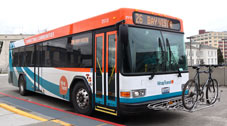 Routed Buses
Routed Buses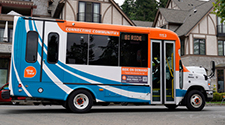 On-Demand/Dial-A-Ride
On-Demand/Dial-A-Ride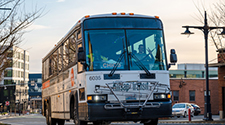 Worker/Driver
Worker/Driver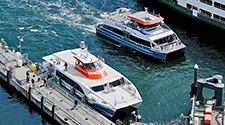 Ferries
Ferries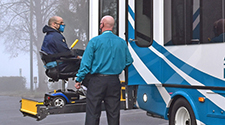 ACCESS & VanLink
ACCESS & VanLink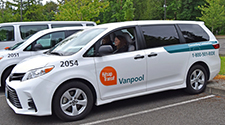 Vanpool, Carpool, SCOOT
Vanpool, Carpool, SCOOT